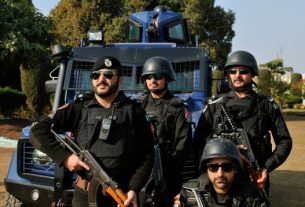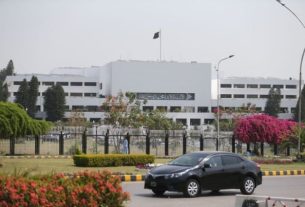Bangladesh’s Nobel Peace Prize-winning economist Muhammad Yunus was sworn in as the head of the country’s caretaker government on Thursday, three days after former prime minister Sheikh Hasina was forced to quit and flee the country following violent protests.
“I will uphold, support and protect the constitution,” Yunus said during the swearing-in ceremony, adding that he would perform his duties “sincerely”.
More than a dozen members of his cabinet, who are titled advisers, not ministers, also took the oath.
They included top leaders of the Students Against Discrimination group that led the weeks-long protests, Nahid Islam and Asif Mahmud.
Others included a former foreign secretary and a former attorney general, an environmental lawyer, and prominent rights activist Adilur Rahman Khan who was sentenced to two years in jail during Hasina’s rule.
Yunus, 84, was recommended for the role by student protesters and returned to Dhaka earlier today from Paris, where he was undergoing medical treatment.
“The country has the possibility of becoming a very beautiful nation,” an emotional Yunus told reporters at the Dhaka airport, where he was greeted by top military officers and student leaders.
“Today is a glorious day for us,” Yunus said.
“Bangladesh has created a new victory day. Bangladesh has got a second independence,” the economist said.
The student protesters had saved the country and that freedom had to be protected, he said, adding: “Whatever path our students show us, we will move ahead with that.”
Yunus called for the restoration of order after weeks of violence that left at least 455 people dead, calling on citizens to guard each other, including minorities who came under attack.
“Law and order is our first task … We cannot take a step forward unless we fix the law and order situation,” he said.
“My call to the people is if you have trust in me, then make sure there will be no attacks against anyone, anywhere in the country.”
“Every person is our brother … our task is to protect them,” he said, adding that “the whole of Bangladesh is one big family”.
Yunus choked with emotion as he recalled the killing of student activist Abu Sayeed, shot dead in July by police from close range.
He paid tribute to the youth who sparked the protest movement and those who risked all for their desire for change. “They protected the nation and gave it a new life”, he said.
Yunus will be the chief adviser in the interim government tasked with holding fresh elections in the South Asian country of 170 million people.
The student-led movement that ousted Hasina grew out of protests against quotas in government jobs that spiralled in July, provoking a violent crackdown that drew global criticism, although the government denied using excessive force.
The protests were fuelled also by harsh economic conditions and political repression in the country.
Yunus will head a caretaker government that is being established by the military, which turned on Hasina over the weekend after hundreds of people were killed in the unrest.
The prospect of Yunus standing alongside military leaders was almost unimaginable a week ago when security forces fired deadly rounds at protesters who took to the streets demanding that Hasina resign.
But the military turned on Hasina at the weekend and she was forced to flee to neighbouring India — as millions of Bangladeshis celebrated her demise.
The military then agreed to student demands that Yunus — who won the Nobel in 2006 for his pioneering microfinancing work — lead an interim government.
Hasina’s Awami League party does not figure in the interim government after she resigned on Monday, following weeks of violence that killed more than 400 people and injured thousands.
In a Facebook post, her son Sajeeb Wazed Joy said the party had not given up, however, and was ready to hold talks with opponents and the interim government.
“I had said my family will no longer be involved in politics but the way our party leaders and workers are being attacked, we cannot give up,” he said on Wednesday.
Meanwhile, Indian Prime Minister Narendra Modi offered his “best wishes” to Yunus, saying New Delhi was “committed” to working with neighbouring Dhaka.
“My best wishes to Professor Muhammad Yunus on the assumption of his new responsibilities,” Modi wrote on social media platform X.
“India remains committed to working with Bangladesh to fulfil the shared aspirations of both our peoples for peace, security and development.”
During Hasina’s reign, Yunus was hit with more than 100 criminal cases and a smear campaign by a state-led religious agency that accused him of promoting homosexuality.
Yunus had travelled abroad this year while on bail after being sentenced to six months in jail on a charge condemned as politically motivated, and which a Dhaka court on Wednesday acquitted him of.
Army chief General Wakeruz Zaman said on Wednesday he supported Yunus.
“I am certain that he will be able to take us through a beautiful democratic process,” Zaman said.
Few other details about the planned government have been released, including the role of the military.
But Bangladeshis voiced hope as they joined a rally in Dhaka on Wednesday for the former opposition Bangladesh National Party (BNP).
“I expect that a national government will be formed with everyone’s consent in a beautiful way,” Moynul Islam Pintu told AFP.
“I expect that the country is run in a nice way, and the police force is reformed so that they can’t harass people.”
Hasina, 76, who had been in power since 2009, quit on Monday as hundreds of thousands of people flooded the streets of Dhaka. Jubilant crowds later stormed and looted her palace.
Monday’s events were the culmination of more than a month of unrest, which began as protests against a plan for quotas in government jobs but morphed into an anti-Hasina movement.
Hasina, who was accused of rigging the January elections and widespread human rights abuses, deployed security forces to quash the protests.
At least 455 people were killed in the unrest, according to an AFP tally based on police, government officials and hospital doctors.
“The protests are a seismic moment in Bangladesh’s history,” said International Crisis Group analyst Thomas Kean.
“The country really had been at risk of becoming a one-party state, and through a peaceful street-based movement led by, Gen Z students in their 20s, they’ve managed to force her from power.”
Military move
The military’s switching of allegiance was the decisive factor in her demise.
It has since acceded to a range of other demands from the student leaders. The president dissolved parliament on Tuesday, a key demand of the students and the BNP.
The head of the police force, which protesters have blamed for leading Hasina’s crackdown, was sacked on Tuesday.
The new chief, Mainul Islam, offered an apology on Wednesday for the conduct of officers and vowed a “fair and impartial investigation” into the killings of “students, common people and the police”.
Ex-prime minister and BNP chairperson Khaleda Zia, 78, was also released from years of house arrest, while some political prisoners were freed.
The military has demoted some generals seen as close to Hasina and sacked Ziaul Ahsan, a commander of the feared Rapid Action Battalion paramilitary force.
Police said mobs had launched revenge attacks on officers and Hasina’s allies, and also freed more than 500 inmates from a prison.
Protesters broke into parliament and torched TV stations. Others smashed statues of Hasina’s father, Sheikh Mujibur Rahman, the country’s independence hero.
Since Tuesday, however, streets in the capital have been largely peaceful.__Courtesy dawn.com





